Freddy Beans here for an interview with director Justin McConnell. (LIFECHANGER) I absolutely recommend you check this 80’s inspired horror movie out! It’s a lot of shapeshifting fun. You can see my review here.
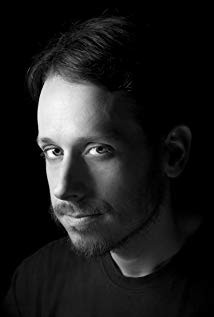
*Transcribed phone call
Freddy Beans: Hello Justin, how are you doing today?
JM: Pretty Good, how are you?
FB: I’m hanging in there. I had the day off, so I can’t complain.
JM: Absolutely. So you’re with AINTITCOOLNEWS.COM, what’s your name there?
FB: Freddy Beans.
JM: Oh, you’re Freddy Beans. Okay, that seems obvious now. (Laughs)
FB: (Laughs) Well, we’ve talked about getting rid of all the monikers recently anyway. That’s a free bit of insider news for you.
JM: That’s got to be a big deal, over there?!?!
FB: It will definitely be a big change but I have nothing to hide. I loved LIFECHANGER. I had a really great time with it. It seemed to harken back to the old 80’s movies and even older that I love like THE HIDDEN, LIFEFORCE, and definitely INVASION OF THE BODY SNATCHERS. In your words can you give us a synopsis of what LIFECHANGER is about for our readers?
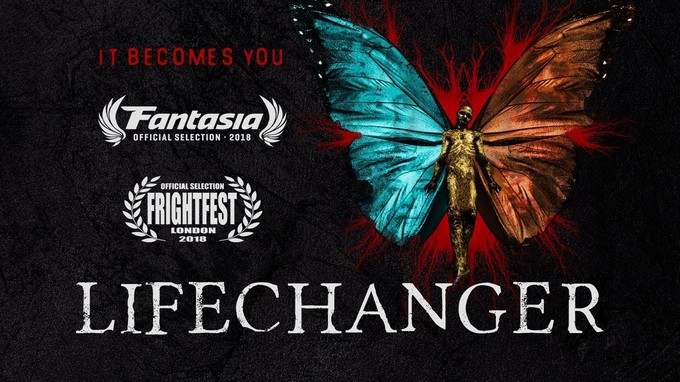
JM: Sure. LIFECHANGER at its core is a shapeshifter who is on a mission to do one good thing after a lifetime of doing terrible things. However, he’s kind of schizophrenic and has a long period of just being a very sick person. So that one good thing is potentially as damaging as anything else he’s ever done. I don’t want to give away much more than that. It is very much a character study and the entire film is told from the perspective of the villain. It’s much more the universal monsters approach, where you’re with the villain. Who is maybe sympathetic but also maybe not, forgivable.
FB: That’s great man. Yeah, I understand the precarious tightrope you’re walking right there. I think you traversed it well, without divulging too much. What was your favorite part of directing LIFECHANGER?
JM: There are a lot of favorite parts, so it’s hard to narrow it down. This was a very personal one for me. In a lot of ways, I kind of looked inward at myself and took some of the ugliness I saw in my 20’s from relationships and some existentialism I was dealing with at the time. I was also going through a kind of heavy depression during this period, after losing my best friend of the last decade, Kevin. He died a few years before I started writing this. So I guess, I exercised all those demons onto the page and exaggerated things to psychotic degrees. It kind of made it a refresher of real life but in a heightened kind of way. It was nice to get that out. The first draft just kind of flowed because so much of it was picking around in my head already. I think my favorite thing, when we finally got on set was just seeing all the actors ready on set. Delivering and bringing it to life, after the amount of time it took from first writing to when we actually got the money together and then all the rewrites. To actually see this one happen, because I thought it might be a little too weird to get financed. To actually be on set and experience making it every day, it was stressful. We didn’t have a ton of money or shoot days but every day there was a moment where I sat back and just said to myself, “Wow, it’s actually getting made.” That and post when it was coming together. That was stressful because I had 8 producers and lots of opinions but at the end of the day to see a finished film that was very true to what I was intending. It was very rewarding.
FB: That’s an awesome in depth answer. I appreciate the honesty of that, thanks Justin. To play the flipside here, what was the worst or hardest part of making this film?
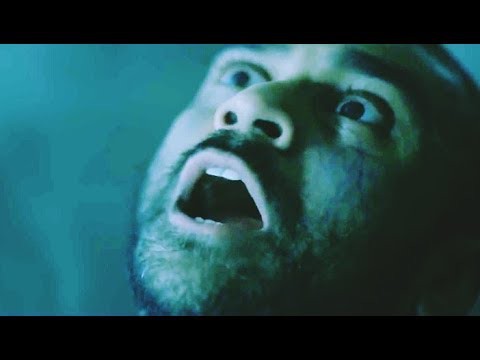
JM: I’ve kind of learned how to let go of ideas, that don’t work anymore. As you get further along in the production, what might have worked on the page, doesn’t’ necessarily work on the edit. It’s been said movies are written three times, once in the script stage, once during production, and finally in post-production. That’s entirely true. We had a lot of difficulties, just from the nature of making a low budget film. One day we had booked a location with the apartment owner but not with the landlord. So the landlord showed up and tried to kick us out. He tried to confiscate all of our footage and it was just a nightmare of a day. Luckily, we got past that. I think maybe the most difficult part during post was also the most rewarding and difficult because my initial cut of the film was 118 minutes. Obviously that was way too long and I get that by cutting it down to the 84 minutes it is now. I showed a version of it to a test audience at 104 minutes. There was a 98 minutes version. It just kept getting shorter and shorter. The fights over what to keep and what not to keep with the team got stressful at times but ultimately, it resulted in the best the film could be. There may be one or two scenes that will be on the deleted scenes of the DVD or Blu-Ray that maybe I could have kept in there that we took out. I still think it’s the right call. But the purist, or pure director in me, thinks no, those scenes should still work. I’m very thankful that I have such a great group around me. I know we may not have agreed on everything. They still gave me the freedom to say “No” when I truly believed that the suggestion wasn’t helping. It was a good environment to produce a film in. Good partners to produce it with. Once the film was finished and it was well received, everyone was kind of like, “Oh, ok! Well I guess that works.” The idea was to put 10 people in a room. Get their opinions and work through issues. We had 8 producers and we already had 9 people in the room. So it got a little stressful. (Laughs)
FB: Well, I’m glad everyone could be democratic about it. The facts are, that’s never going to be an easy part of the process. You’re always going to hurt somebody. I loved what you ended up with personally speaking. The story moved along quickly and everything seemed nice and tight. You largely went old school effects. I love that choice man! I’m assuming that was a conscious effort? How hard is it this day and age not to lean on CGI?
JM: It has to be a conscious effort. You have to start building the effects weeks and weeks ahead of shooting in order to pull them off properly. I never thought we’d go CGI with this one. There are like 16 shots in there, like adding the effect of rain when it really wasn’t raining. Little parts on people’s faces during transformations but otherwise it’s all practical. Part of that comes from growing up in the 80’s and 90’s, in the height of the boom of the special effects era. Where the effects guys themselves, the Screaming Mad Georges, the Rick Bakers, the Steve Johnsons, were as popular as the directors themselves. When I went to Toronto in the early 2000’s, I fell in with a thread group of practical and prosthetics effects artists. And Kevin, who was my writing partner and best friend who passed away was a prosthetic artist. So even in my early films I was learning how to plan for effects and how to work with effects people. So when it came time for LIFECHANGER, I went up to David Scott who came on board for most of the effects. He did stuff on DAWN OF THE DEAD (2004), SILENT HILL, JACK BROOKS: MONSTER SLAYER, that Netflix series SLASHER. His team of Alexandra Anger and Tabitha Burtch were really good as well. I met with them really early and explaining each effect we had pictured and then him approaching with a way to fix the problem. While also getting it in a way that wasn’t too expensive because we did have a low budget. There’s one effect at the end of the movie that I knew only one person could do properly and that was Chris Nash. He was the director of Z is for Zygote in ABC’S OF DEATH 2. He’s also a very talented effects person in his own right and I knew the way I wanted the effect to look. And I knew that Chris and his partner Audrey Barrett were the only people I really wanted to try and pull off that last effect. I knew it was going to take months to platform and they pulled it off incredibly well. If you want to do practical effects, you can get anyone to work relatively inexpensively on a project they think is cool, including big guys. They’ll do it if it hits them because they don’t get approached as much. They’ll either do a small amount of cool stuff on giant projects or they’ll get to do really cool stuff on smaller projects on a smaller budget. The problem is you have to approach them early enough. A good example is the guys who made THE VOID. They’re big effects people too. They Crowdfunded so they could start building the effects before production. You can actually save yourself a lot of money doing practical effects with a good plan because Computer graphics aren’t cheap either. It’s cheap if you cut a lot of corners. Really good FX which can complement a prosthetic effect film and you really never notice, are not cheap. There’s a ton of movies available with cheap effects, that’s my distinction.
FB: Well like you said you need the foresight of what you want to do and what that will run you. It’s key to working in special effects, it’s just the deal. I’m a real big fan of the music you used in LIFECHANGER. The synthesized beats literally sounded ripped off from INVASION OF THE BODY SNATCHERS. I’m sorry for the term “ripped off.” I’m assuming that film was a huge influence. I just wanted to see if you could kind of explain your choice in music and your reasons for using it.
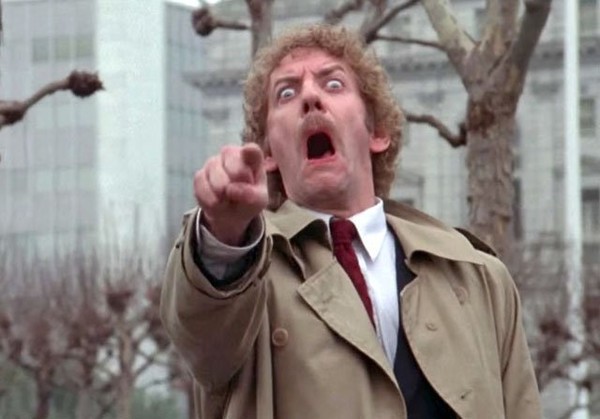
JM: Sure. Well my composer for the film Sean Motley I’ve worked with on a number of films. He did the music for my last feature BROKEN MILE. He did a bunch of the music in SKULL WORLD, which is a documentary I made. He’s kind of a chameleon, for instance he does a lot of the music for Honest Trailers. He has to mimic the styles of everybody. When I approached him I didn’t specifically say it has to sound like the INVASION OF THE BODY SNATCHERS. I sent him a lot of different composers and musicians that I really like Kreng who did the music for LOWLIFE. Also, Johan Johannsson who did the music in MANDY and SICARIO. I just send Sean a bunch of music to help get him in the mindset and then I cut scored the way that I felt that the film should sound. That’s the original score that kind of ended up in the movie. I didn’t want to overly synthesize the sound but still be electronic and driving. We really have a great rapport back and forth. He’s a drummer for band called Tub Ring, which I have been working with since the early 2000’s. My previous composer was Rob Kleiner who is the keyboard player for that band. So I guess I like to keep it in the family. The other side of things is the music, the actual songs that I used. A lot of that came from Razor to Wrist Records which is a record label run by the members of Dog Fashion Disco. I licensed some songs from Polkadot Cadaver and El Creepo. I licensed some songs Chris Alexander did that sounded like BLADE RUNNER songs to me. It built this sort of pastiche that I was going for, without overpowering the movie. Does that make sense?
FB: Yes, absolutely. I thought the music was fantastic. It keeps everything nice and taut. It’s a great patchwork quite honestly. You’re next film looks like a documentary called CLAPBOARD JUNGLE: SURVIVING THE INDEPENDENT FILM BUSINESS, tell us about that please.
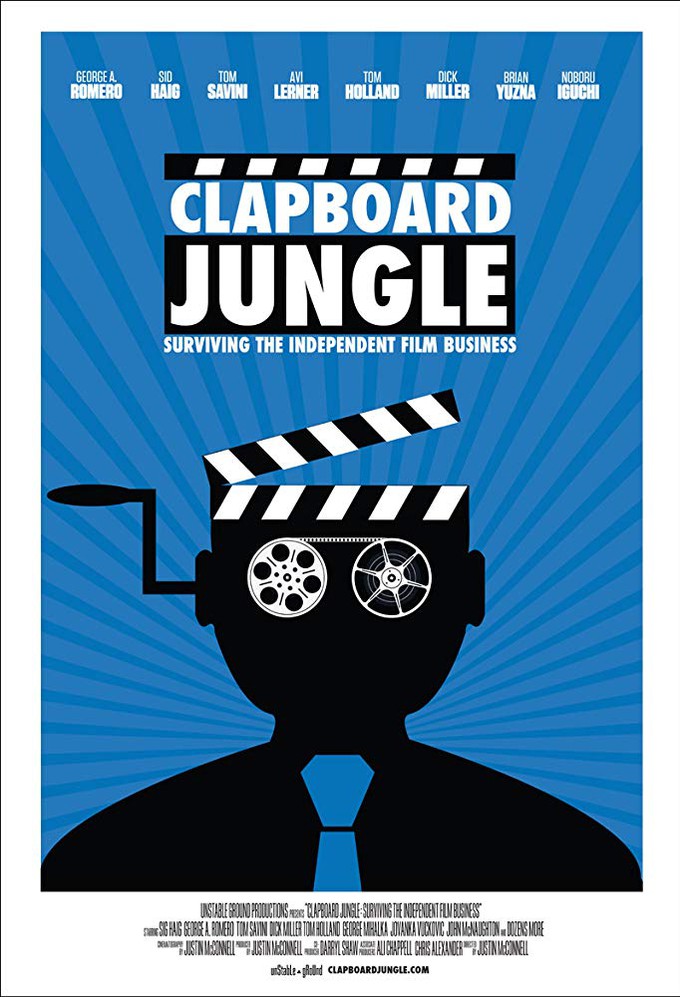
JM: It’s actually an 8 part series. It’s basically a film school in a box. I could have used this 16 or 20 years ago when I was starting out. I’ve interviewed over 120 people, including Guillermo Del Toro and one of the final George A. Romero interviews. People on that level and every level in the business were interviewed. I’m trying to give people an insider view into how film, the business side of it, actually works. There are also 2 films we are filming in the spring. One of them is MARK OF KANE, based on the novel Kane by Michael Prescott. I’m a co-writer/co-producer on with Serhat Caradee directing. The other is DO YOU SEE WHAT I SEE, it’s an action packed Christmas horror film that I co-wrote and co-directed with Serena Whitney. So there’s some stuff coming up for sure.
FB: That sounds fantastic! I already want to see both of those, especially an action packed Christmas horror film.
JM: There’s actually a short film that we co-directed that’s on Youtube.com that you can watch.
FB: Sweet! I also oved your film idea on an insider look at the independent film business. I just finished a novel by Don Coscarelli, True Indie…
JM: I’m reading it currently.
FB: Oh man, it’s fucking fantastic! It kind of shows you the hazards and how screwed up the process is and can be. It also gives you a little bit of a road map to drive down, which I felt was bad ass. It’s motivating in a lot of ways. So yeah, I can’t wait to see CLAPBOARD JUNGLE.
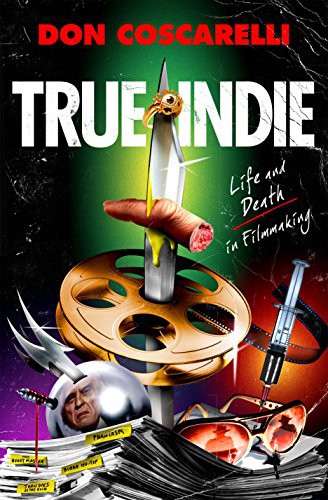
JM: It’s been a long road. I have over 400 hours of footage that has to get cut down in a way that’s entertaining. I’m working on it now with my editor Kevin Burke, who directed 24 X 36: A MOVIE ABOUT MOVIE POSTERS which played Fantastic Fest a few years ago. We’ve put a big dent in it.
FB: I truly can’t wait to see it, just hearing your passion on it. What’s your favorite horror movie?
JM: (Laughs) Shit! I’ll preface it with, I don’t really like this question because I’ve watched too many films in my life to have a favorite, so I’d like to answer it with the ones I saw when I was younger. The ones that got me going, that’s easier for me to say. MONSTER SQUAD is kind of the one that lit a spark in me.
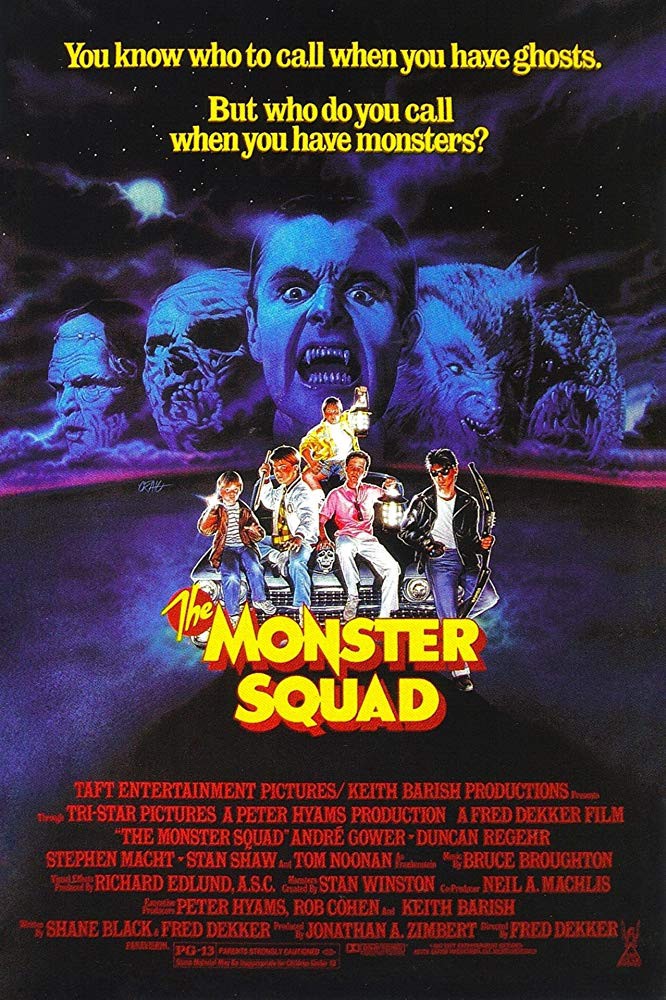
FB: (Laughs) I’m dying!
JM: (Laughs) I saw that when I was very young. Then when I got more serious, the ones that I guess set me on the path would be IN THE MOUTH OF MADNESS and Wes Craven's NEW NIGHTMARE. Which I think is kind of funny because they both have existential narratives. Both of those movies opened my eyes, to film doesn’t have to be a story like in a straight line. It can be this kind of larger, more experimental, more meaningful kind of thing than a standard horror film. I mean how long you got? We could be here all day. I love any film with small puppet monsters, the CRITTER’s series, the GREMLIN’s series, even fucking HOBGOBLINS. It’s not a very good movie but give me a small puppet like the GHOULIES and I’m very happy. You know, one day I’d like to do the Dean Koontz story Darkfall. To me that would be the ultimate tiny puppet movie. (Laughs) We’ll see what happens.
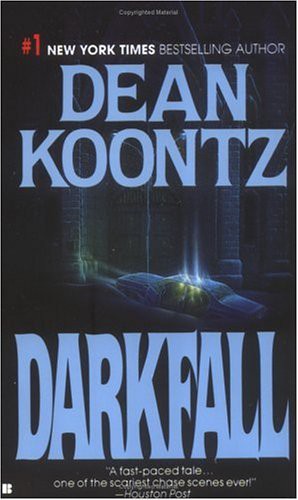
FB: (Laughs) I love your answer. Everyone kind of hates the question. Especially the real horror aficionado’s because I’m springing it on them and they tend to go to the obvious ones. You read off quite a few and I appreciate the hell out of that. What’s a documentary that you weren’t involved in, that you think everyone should see?
JM: There’s so many. We’ll talk filmmaking first. There’s a great one called SEDUCED AND ABANDONED, which Alec Baldwin made with James Toback. It’s worth watching if you want to know how the business works in terms of getting your film sold and stuff like that. I really like LAST DAYS HERE. It’s a documentary about a heroin addict/musician, that’s just so well done. DEMON LOVER DIARY is really good, if you can find it. It’s basically like AMERICAN MOVIE but way more depth. I don’t know man. I could be here all day…again. (Laughs)
FB: (Laughs) yeah man, that was awesome. I only have one more for you. Who inspires you or what inspires you and why?
JM: In film, I’m mostly inspired by self-made filmmakers that weren’t handed their careers the George A. Romero’s, the Frank Henenlotter’s. That type of filmmaker that created their own corner of the industry, then stuck with that. Larry Fessendon, or women like Mary Harron. Filmmakers that stuck to their guns and made their movies uncompromisingly, so John Carpenter’s in there too, even though he went studio for a while. In real life, I have to respect my parents fully. Without them, I wouldn’t have the entrepreneur sprit that I have. The idea where if one business fails, you just start another one until you find success. That’s something that’s stayed with me my entire life. There are other people I look up to of course, but my parents are the top of that list.
FB: I’ve been waiting for that answer honestly. You’re the first person to call out their parents.
JM: Really?!?
FB: Really! I’ve been waiting for it man. I thought it would be one of the first answers I’d receive on who inspires a person. I’ve done almost 15 of these here in 2018 and you’re the first and only one. Good luck with LIFECHANGER man! I had a wonderful time with it. Is there anything you wanted to say about the film before we go here?
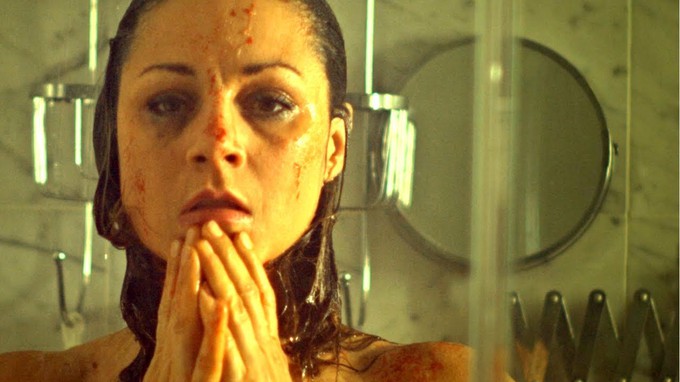
JM: Not particularly. It’s not a film that everyone is going to love but the people that love it will probably really love it. If you don’t love it, that’s fine. Like any artist, I’d say, don’t’ write off an artist because you don’t like one of their pieces of art. Give everybody a chance to keep making something. If you don’t’ like something, give them the opportunity to grow and make something maybe you identify with more. It doesn’t matter if you think Uwe Boll is the worst filmmaker in the world. He may have a masterpiece in his pocket 10 years from now. I’m not saying that will happen, but you never know right? (Laughs)
FB: (Laughs) Absolutely. I like that. In the end if the audience didn’t like LIFECHANGER they’re wrong! (Laughs) Seriously though, it’s a fun film and you should be proud of it!
JM: Thanks Fred!
Til next time Kids
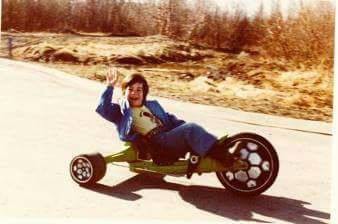
Freddy Beans (AKA: Ken Lewis)
Facebook: https://www.facebook.com/FreddyBeansWrites/
Instagram: freddybeans13
Contact me: freddybeans@gmail.com
